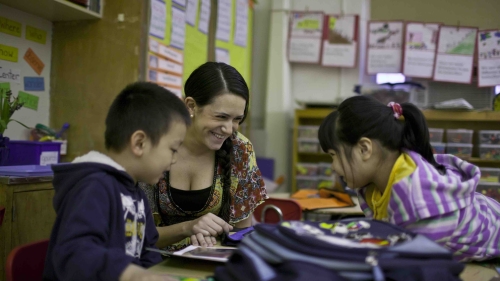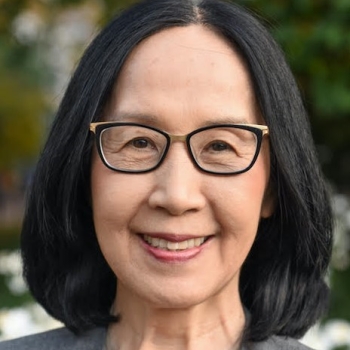

Okhee Lee is a professor and Peter L. Agnew Professor of Education in the Steinhardt School of Culture, Education, and Human Development at New York University. She is widely known for advancing research, policy, and practice that simultaneously promote science and language learning for all students, particularly multilingual learners. Lee was a member of the Next Generation Science Standards (NGSS) Writing Team and served as leader for the NGSS Diversity and Equity Team. She was also a member of the Steering Committee for Understanding Language at Stanford University. Her research involves integrating science, language, and computational thinking with a focus on multilingual learners. Her latest work addresses justice-centered STEM education with multilingual learners by integrating multiple STEM subjects, including data science and computer science, to address societal challenges using the case of the COVID-19 pandemic. Since the early 1990s, her research has been funded by the National Science Foundation (NSF).
Lee brings research to policy and practice. With NSF funding, her team developed a yearlong fifth-grade science curriculum called Science And Integrated Language, or SAIL, that translates contemporary science standards into classroom practice with multilingual learners. Using the SAIL curriculum, Lee’s team published teacher resources in collaboration with the New York State Education Department. In addition, her team published teacher resources in collaboration with the National Science Teaching Association and made them available nationally and internationally. With NSF funding, her team also developed the SAIL professional development program and a suite of research instruments.
Lee is the recipient of numerous awards and honors, including the following:
- Distinguished Contributions to Science Education through Research Award, National Association for Research in Science Teaching, 2023
- Honorary Doctor of Humanities degree recipient and keynote speaker at Baccalaureate Commencement Ceremony, Michigan State University, 2022
- American Educational Research Association: Exemplary Contributions to Practice-Engaged Research Award, 2021; Division K Innovations in Research on Equity and Social Justice in Teacher Education Award, 2019; Distinguished Career Contribution Award from the Committee for Scholars of Color in Education, 2003
- National Science Teaching Association Distinguished Service to Science Education Award, 2020
- Korean-American Educational Researchers Association Inaugural Distinguished Researcher Award, 2019
- University of Miami Provost’s Award for Research Activity, 2008
Lee is the recipient of multiple fellowships, including the following:
- National Academy of Education member, 2022
- American Association for the Advancement of Science Fellow: Section Q Education, 2021
- American Educational Research Association Fellow, 2009
- Kurtz Fellow, School of Education, University of Miami, 2008-2011
- National Academy of Education Spencer Postdoctoral Fellow, 1993-1995
Lee provides leadership for regional, national, and international organizations and institutions across multiple fields, including the American Association for the Advancement of Science, American Educational Research Association, Center for Applied Linguistics, National Academy of Education, National Association for Research in Science Teaching, National Science Foundation, New York City Department of Education, New York State Boards of Cooperative Education Services, and New York State Education Department.
For more information, please visit the following:
https://en.wikipedia.org/wiki/Okhee_Lee
https://www.youtube.com/channel/UCmptRBGO6G6yl4Ph0n7Pr_w/featured
Selected Publications
Lee has authored 140 referred journal articles; 6 books; over 30 book chapters; 6 handbook chapters; over 40 editorials; and various briefs, monographs, committee documents, and instructional and curricular resources. Lee’s research on how to teach science/STEM to multilingual learners, how to align English language proficiency/development standards with content/science standards, and how to promote equity and justice in STEM education is regularly published in the field’s most prestigious journals. Here are select publications that support her efforts to advance K-12 STEM education, especially for multilingual learners:
- Lee, O., & Grapin, S. E. (2025). STEM education with a focus on equity and justice: Traditional approaches, contemporary approaches, and proposed future approach. Journal of Research in Science Teaching. Advance online publication. https://doi.org/10.1002/tea.70013
- Lee, O., & Grapin, S. E. (2025). Justice-centered STEM education with multilingual learners to address societal challenges: A conceptual framework. Journal of Research in Science Teaching, 62(5), 1202-1231. https://doi.org/10.1002/tea.21999
- Lee, O., Haas, A., & Grapin, S. E. (2025). Science education for equity and justice with multilingual learners. National Science Teaching Association.
- Lee, O., & Grapin, S. E. (2024). English language proficiency standards aligned with content standards: How the Next Generation Science Standards and WIDA 2020 reflect each other. Science Education, 108(2), 637-658. https://doi.org/10.1002/sce.21843
- Lee, O., Grapin, S. E., & Haas, A. (2023). Teacher professional development programs integrating science and language with multilingual learners: A conceptual framework. Science Education, 107(5), 1302-1323. https://doi.org/10.1002/sce.21807
- Lee, O., & Grapin, S. E. (2022). The role of phenomena and problems in science and STEM education: Traditional, contemporary, and future approaches. Journal of Research in Science Teaching, 59(7), 1301-1309. https://doi.org/10.1002/tea.21776
- Lee, O. (2021). Asset-oriented framing of science and language with multilingual learners. Journal of Research in Science Teaching, 58(7), 1073-1979. https://doi.org/10.1002/tea.21694
- Nordine, J., & Lee, O. (Eds.). (2021). Crosscutting concepts: Strengthening science and engineering learning. National Science Teaching Association.
- Lee, O., & Campbell, T. (2020). What science and STEM teachers can learn from COVID-19: Harnessing data science and computer science through the convergence of multiple STEM subjects. Journal of Science Teacher Education, 31(8), 932-944. https://doi.org/10.1080/1046560X.2020.1814980
- Lee, O., & Stephens, A. (2020). English learners in STEM subjects: Contemporary views on STEM subjects and language with English learners. Educational Researcher, 49(6), 426-432. https://doi.org/10.3102/0013189X20923708
- Lee, O. (2019). Aligning English language proficiency standards with content standards: Shared opportunity and responsibility across English learner education and content areas. Educational Researcher, 48(8), 534-542. https://doi.org/10.3102/0013189X19872497
- Lee, O. (2018). English language proficiency standards aligned with content standards. Educational Researcher, 47(5), 317-327. https://doi.org/10.3102/0013189X18763775
- Lee, O. (2017). Common Core State Standards for ELA/literacy and Next Generation Science Standards: Convergences and discrepancies using argument as an example. Educational Researcher, 46(2), 90-102. https://doi.org/10.3102/0013189X17699172
- Lee, O., Miller, E., & Januszyk, R. (Eds.). (2015). NGSS for all students. National Science Teachers Association.
- Lee, O., Quinn, H., & Valdés, G. (2013). Science and language for English language learners in relation to Next Generation Science Standards and with implications for Common Core State Standards for English language arts and mathematics. Educational Researcher, 42(4), 223-233. https://doi.org/10.3102/0013189X13480524
- Fradd, S. H., & Lee, O. (1999). Teachers' roles in promoting science inquiry with students from diverse language backgrounds. Educational Researcher, 28(6), 14-20, 42. https://doi.org/10.3102/0013189X028006014
- Lee, O., & Fradd, S. H. (1998). Science for all, including students from non-English language backgrounds. Educational Researcher, 27(4), 12-21. https://www.jstor.org/stable/1176619
